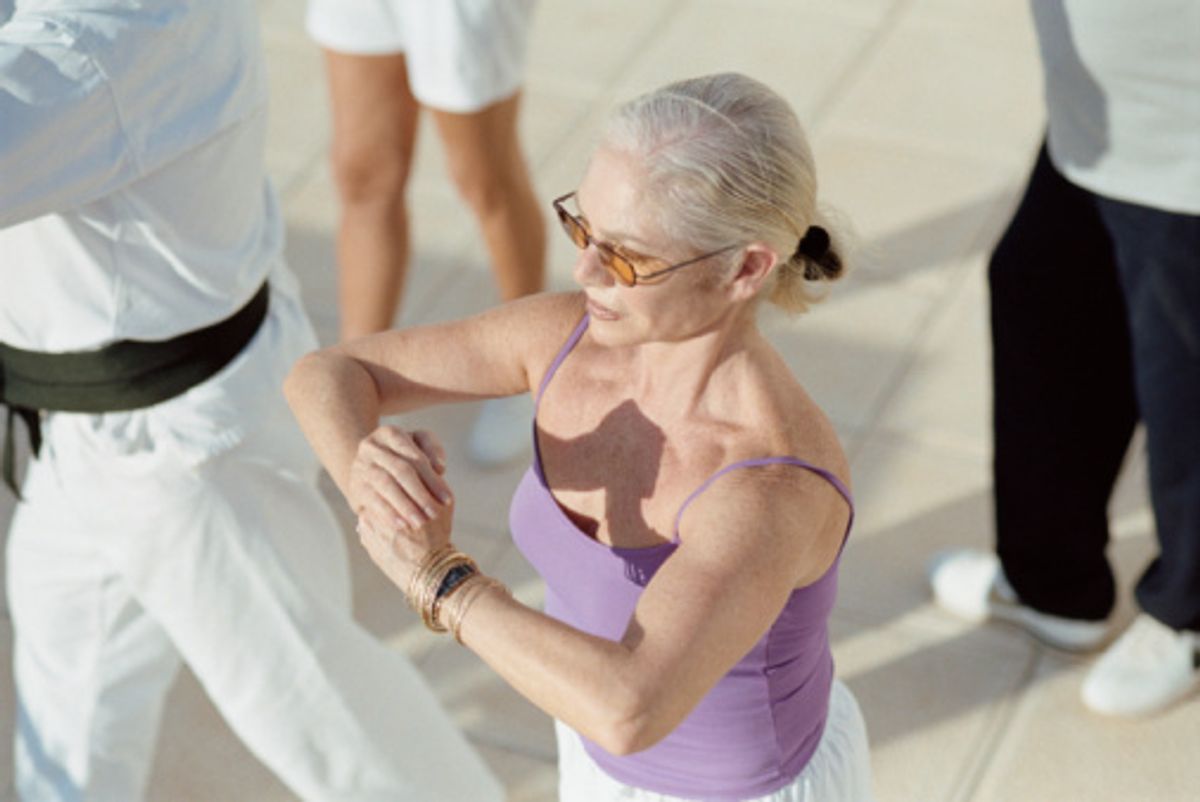Were you dragged to ballet class as a child, when your heart really yearned for a softball glove? Did you spend your free hours curled up with books, wondering what it would be like to ride Black Beauty?
It's not too late to try a new sport, whether it's one that was a childhood dream or something that caught your fancy as an adult. "People try new sports for a variety of reasons, including finding new ways to be physically active, to challenge themselves, or to keep in shape," says Kathleen M. Weber, MD, director of the Women's Sports Medicine Program at Rush University Medical Center, Chicago. "There may be work-sponsored leagues or activities that employees join for camaraderie or to expand their social circles."
Isn't learning a new sport dangerous for middle-aged bodies? Dr. Weber, who's seen her share of torn ligaments, fractures and other woes, stresses the importance of wearing sports-appropriate protective gear—helmets, as well as padded guards for your wrists, knees and elbows. She cautions that it takes time to get good at a new sport. "It is important to remember that although you are excited about trying something new, it is crucial to pace yourself and gradually increase your activity to avoid injury," she says. "People who are thinking about getting involved in a new sport might consider working with a fitness professional or seeking consultation from a medical professional."
Don't quit your new sport until you've developed those skills enough to enjoy yourself, advises the American College of Sports Medicine (ACSM). If a sport requires too many skills that you don't have, like quick dribbling or good eye-hand coordination, pick something else.
Facing the challenge
As a ski instructor at Crystal Mountain in Thompsonville, MI, Lin Westra has taught plenty of women who were new to skiing. Many thought they had little chance of succeeding on downhill snow. "Some will say, 'I'm a real couch potato, I shouldn't be out here,'" Ms. Westra says. "But they end up loving it."
In a two-hour session, she teaches them how to put on and walk in ski boots, as well as steer, stop and turn on their skis. Her goal is to get them on a beginner hill, having fun safely, during their first lesson. "I don't think there's a woman out there who can't learn to ski," says Ms. Westra. Large women and those who've been sedentary can do well. "They don't have to be an athlete to achieve success."
That's not just professional pride speaking. Ms. Westra, a former art teacher, didn't start skiing until she was 42. "I understand their feelings and their fears," she says. Her advice: Take a clinic or private lesson and rent your gear for the first few times out.
Is skiing good exercise? "You burn a ton of calories," says Ms. Westra, who usually shuns the chair lift to add to her workout. That leaves room for plenty of hot chocolate at day's end.
Which sports should you try?
You'll find clubs or classes in many sports through local groups, gyms and specialty facilities such as skating rinks, tennis centers or indoor rock-climbing halls. "While you're taking lessons in your new sport, you also should be working on building your overall flexibility, strength and endurance. Then you incorporate these new skills into the activity," Dr. Weber advises.
Choose a new activity that's kind to your body while giving you a good workout. Sports involving jumping, twisting or pounding can be tough on your joints. These are kinder, gentler choices:
- swimming
- deep-water running
- cross-country skiing
- snowshoeing
- in-line skating
- cycling
- rowing
- karate, tai chi, soo bahk do (a Korean martial art)
Some physically tough sports can be adapted to keep the fun and exercise without the likely injury risk. Consider "Granny Basketball," a sport played by several teams of women in Iowa, all age 50 or above. Modeled on girls' basketball rules from 1929, players wear bloomers, long-sleeved shirts and high socks. There's no running (but hurrying is allowed), no jumping and no physical contact.
"You can disrupt the throw by trying to hit the ball or steal it," says Catherine Swatta, 58, who had never played basketball at all before trying a Granny Basketball class earlier this year. She then joined a team in Des Moines and now practices weekly.
Health benefits of a new sport
Ms. Swatta's doctor approved of her playing Granny Basketball as a good way to stay active, help control her diabetes and drop a few pounds. "Even though there's no running, you're still moving. I was surprised how much exercise I was getting," Ms. Swatta says. "I've lost some weight and the muscles in my arms are getting firmer."
She had been exercising with machine weights at the school where she works. "That's fine, but it's boring," she says. "I like this much better."
"People are successful in becoming and staying more active if they enjoy what they're doing," says Dr. Weber. She notes that some of her patients find their new favorite sports during rehabilitation, while she's treating them for injuries or other problems.
Dr. Weber encourages patients with arthritis to participate in low-impact activities, such as water aerobics, cycling, yoga or pilates. "They begin to explore new activities that they wouldn't have done before or have never heard of," she says. "And they discover that they really enjoy it."







